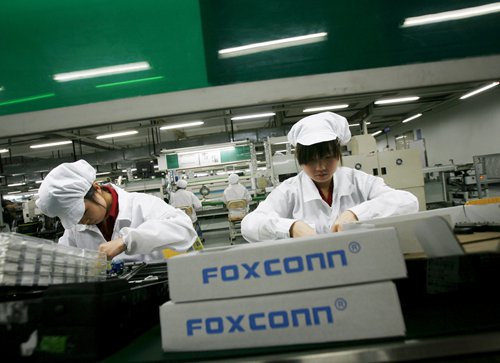HOME >> BUSINESS
Google, Foxconn warned to be wary of disrupting supply chains
By Chen Qingqing Source:Global Times Published: 2019/6/12 20:33:40

Employees work at a Foxconn factory in the township of Longhua in Shenzhen, South China's Guangdong Province. Photo: VCG
Is decoupling of US and Chinese technology supply chains imminent amid the escalating trade war? After Foxconn - a major contractor of US technology giant Apple - and Google reportedly moved part of their production lines out of China, industry representatives and analysts said increasingly disrupted supply chains will cause serious damage to US technology companies and warned them not to take the risk.
Google is moving more hardware production out of China including some production of Nest thermostats and server hardware, a move to reduce the impact of rising US tariffs while facing a more unfriendly attitude by the Chinese government amid the trade war, Bloomberg reported on Wednesday, citing unidentified sources.
Meanwhile, Foxconn, the largest contractor of Apple, said it is prepared to shift production for the iPhone and related products out of China if necessary, the Wall Street Journal reported on Tuesday, citing Young-way Liu, the head of Foxconn's semiconductor business group.
"We're always monitoring and assessing our supply chain and determining the operations network that will help us get great products into the hands of our customers, and we'll continue to do so," a Google spokesperson told the Global Times on Wednesday, declining to give further details about the company's supplier list and related information.
Foxconn said it follows a strict company policy of not commenting on any matters related to current or potential customers, or any of their products.
A supplier who works closely with Foxconn told the Global Times on Wednesday that it is impossible Foxconn will take the risk of leaving China at this crucial moment, which will burn its bridges with Chinese authorities.
"For a very long time, central and local authorities supported and granted Foxconn many favorable policies. If it moves out, the Chinese government will launch a probe of it, which will cause serious damage to the company," he said, declining to be identified.
China will soon release its entity list - a blacklist of foreign companies that block and shut supply chains, or take discriminatory measures against Chinese companies, and some analysts predicted that if US-based companies were to sever ties with the Chinese market for political purposes, they would be on the list.
Favorable land and tax policies have attracted manufacturers to increase their footprints in China. For instance, when the local government in Zhengzhou, Central China's Henan Province, tried to attract Foxconn in 2010, it came up with a policy that a company that invested more than $30 million with certain amount of grant fee would enjoy "zero cost" land use, according to local media reports.
"There is no other country in the world that has full-scale supply chains like China, even in Southeast Asia. We're now encountering difficulties in labor force recruiting in Vietnam," the supplier said.
Foxconn shifted some of its production for Apple to Vietnam in recent years. However, its plants in Zhengzhou remain a major assembly base for products like the iPhone.
"US technology giants are now caught in this dilemma. They took some moves to ease the concerns of investors as China-US relations continued deteriorating, but they won't take the action of leaving China," Song Guoyou, director of Fudan University's Center for Economic Diplomacy, told the Global Times on Wednesday.
As part of globalization, technology giants like Google, Apple and Intel have become an inseparable part of supply chains and have been closely tied to Chinese companies, and they're unwilling to cut these connections, he said.
Intel is also pushing the US government to allow it to continue supplying components to Huawei, domestic financial news site caixin.com reported on Tuesday, as the executive order will cause both damage and burden to the American company.
While US technology companies are reportedly lobbying Washington to let them cooperate with their Chinese counterparts, it will take progress in the halted trade talks between the two countries to resolve this problem. "Washington has not cared much about the interests of its technology companies, considering Trump's hostility to them. This needs to wait until trade talks resolve this dilemma," Song said.
Talk of China-US decoupling is irresponsible and extremely risky, and it comes from statements made by a small number of US people who hold cold war and zero-sum game mentalities. This stance violates the essence of China-US cooperation, Geng Shuang, spokesperson of the Chinese Foreign Ministry, told a press briefing on Wednesday.
"The two countries have been deeply connected as important trading partners and investment destinations. In 2017, US companies recorded revenues in China of more than $700 billion, with profits exceeding $50 billion," he said, noting that politicians should ask companies and industries first whether they want to cut off ties.
China and the US hold important positions in global supply chains, while forcing them to decouple will disrupt the global industry and trigger turbulence in financial markets, Geng added.
Newspaper headline: China-US technology decoupling unlikely: analysts
Posted in: ECONOMY